Mbombela Stadium
It is located 6 kilometres west of Mbombela, the capital of the Mpumalanga province and is the largest venue in the province. The R1,050-million facility was ready for use well ahead of the June 2010 World Cup kickoff and was funded entirely through central government taxpayer funding, requiring no financing by the city.
Construction
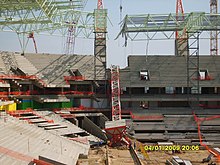
Construction commenced in February 2007 and was completed in November 2009. The construction contract was awarded to a South African–French consortium of Basil Read Construction and Bouygues.
The structure is founded on 1,500 piles on a 10m structural grid. Each roof support (in the shape of a giraffe) sits on 18 piles on the 30m major structural bay. The 10m span seating beams are prestressed and most of the 3,170 units were pre-cast on site.
The project was subjected to numerous wildcat strikes. With the 5th and final strike, all main contract labourers were dismissed. All subsequent work was performed by subcontractors.
During a freak storm in January 2009, a tower crane blew over and cut through the partially completed roof. The site was unoccupied at the time and there were no injuries. The construction required a total of 5.5 million man-hours to complete.
The site accident history was exceptionally safe with the worst injury being a broken ankle. A record was set of 2.4 million consecutive injury-free hours.
Design
The stadium design reflects its inter-relation with the nearby Kruger National Park. The signature feature of the stadium are the 18 roof supports that resemble giraffes. The seats are patterned with zebra stripes. Visitors to the venue can easily add on a side-trip to the game reserve.
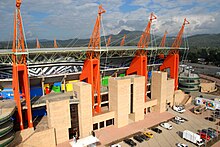
Seating
The bowl design aimed to put every seat as close as practical to the field action and maintain excellent sightlines over the heads of spectators. This venue is the most compact arena of all 2010 venues. Most seats 95% are covered by the cantilever roof.
The seating capacity is 43,500. In FIFA WC configuration it seated 40,929 with regular seats lost to the media tribune. The seating is divided into 3 tiers with 21,000 lower tier, 3,500 middle tier and 19,000 on the upper tier. The upper tier is accessed by 8 wide ramps located on the corners. The ramps accommodates small delivery vehicles. The middle tier, which is accessed by elevators, has premium seating with a VIP lounge, restaurant, club lounges and 25 private boxes.
Pitch
The pitch is sized for association football (105x68m) and Rugby Union (100x70m). It is floodlit to 2,200 lux to meet FIFA requirements which is on full backup power from diesel generators. The cool season rye grass pitch grown from seed is reinforced with Desso GrassMaster artificial turf fibres which anchor the field, creating what is essentially a semi-synthetic pitch for a stable and a level grass surface and has no problem standing up to extreme abuse during a rugby scrum.
The pitch was the cause of great concern and some ridicule 5 months before the World Cup, but its perfect performance in its first real test on 16 May 2010 silenced the critics.
The selection of rye grass was a directive from FIFA specifically for the World Cup. It is not an ideal grass type for the very hot and humid summer conditions common in Mbombela. In January 2013 an unfortunate and unusual long spell of unbroken rainy and weather caused a grass fungus which killed off most of the grass in the run-up to the 2013 African Cup of Nations. Concerns were raised over the playing surface with Togo striker Emmanuel Adebayor describing it as "sandy" and "a disgrace". He went on to say "At the end of the day we are all African and we have to be honest with ourselves. It's a beautiful stadium but the pitch is not happening".
Subsequent to the pitch failure of AFCON 2013 during summer cynodon is grown which provides a robust and dependable surface during the hot climate. The cynodon is dormant in winter when the rye grass flourishes.
Roof
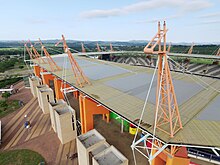
The 1,450 tonne roof covers an area of 22,500 square metres and 94% of the seats. At 55 kg/sqm its super lightweight efficient design kept roof cost in check and meant almost all seats are under roof. The roof is 35m above the pitch. Half of the roof is translucent to maximise sunlight to the pitch and to lighten the seating bowl. The roof appears to float above the top of the seating bowl with an 8 m gap to provide ventilation in the hot climate and also to provide views to the surrounding hills from the seats.
The structure is a propped cantilever on a 30 m module with the steel towers for the tension rods doubling as symbolic giraffe necks. The floor of the service catwalk is 110mm thick concrete acting as ballast to resist wind uplift.
Controversies and corruption
Allegations of corruption relating to the awarding of construction contracts in the building of the stadium plagued the project. At least three individuals were murdered in connection with the allegations, and another three have died under mysterious circumstances.
Assassination
The Speaker of the Mbombela Council, Jimmy Mohlala had been a longstanding and vocal critic of corruption in the province. In late 2008 Mohlala began legal steps to cancel the Lefika Emerging Equity design contract for the new stadium based on a fraudulent tax clearance certificate submitted as part their design tender document. He called for a criminal case against soccer boss Bobby Motaung for reportedly forging a Mbombela council letter with a fake signature of former Mbombela municipal manager Sgananda Siboza to obtain an overdraft from a bank. Shortly after taking these steps, in January 2009, Mohlala was brutally assassinated outside his residence in front of his son. Allegations have been made repeatedly that Bobby Motaung and David Mabuza organised the murder of Mohlala. David Mabuza was Premier of the Mpumalanga Province at the time and is now Deputy President of South Africa. For more detailed investigative journalistic accounts around his death read the online articles:.
Corruption
Cancellation of the Design Contract
Lefika Emerging Equity won the design contract for the stadium in April 2006. Lefika was composed of three businessmen. Bobby Motaung, manager of Kaiser Chiefs football club, Herbert Theledi, a businessman with powerful provincial connections, and Chris Grib, a minority shareholder in Lefika and CEO tasked with day-to-day running of the company. Chris Grib left the country in late 2008 under a cloud when it came to light that the SA Revenue Services tax clearance document required to win the design contract was fraudulent. After Jimmy Mohlala was assassinated weeks after he attempted to cancel the design contract, the balance of the construction till completion proceeded with Lefika effectively absent, but still earning their professional fees. No officials were brave enough to continue attempts to cancel the design contract.
Arrests
Despite their wrongdoings being widely reported, Lefika enjoyed political protection by the provincial ANC under the leadership of premier David Mabuza and the Jacob Zuma-faction who reportedly suppressed the powerful evidence against Lefika and blocked legal prosecution against them for three years. On 15 August 2012, all three Lefika directors were arrested for tender fraud related to the stadium's design contract by the Special Investigations Unit, known as the Hawks, an independent national investigations unit. All three were released on bail and returned to court on 15 October 2012. Chris Grib was out of the country when Jimmy Mohlala was murdered and when Lefika forged a document on a Municipal letter head used to apply for a R1 million overdraft from Nedbank so he was expected to testify against his co-directors Motaung and Theledi under a plea deal for a lesser sentence. The case was heard but charges later dropped. In January 2016 the case was re-investigated and the reinstatement of charges was being considered by the National Prosecuting Authority however nothing came of this. By July 2016 the case was struck off the roll due to a lack of evidence among talk of Bobby Motaung intimidating witnesses from testifying. In November 2017 the National Prosecuting Authority announced that the fraud case would no longer be pursued for lack of evidence. The dropping of charges were reportedly due to Zuma-faction members within the National Prosecuting Authority suppressing the evidence.
Municipality placed under Administration
Corruption related to general municipal mismanagement and the construction of the stadium resulted in the provincial government taking over the running of the municipality and construction management. The Municipality was placed under administration in June 2007. When the Mbombela Municipality was reinstated 5 months later, the outspoken new mayor Lassie Chiwayo and council officials reportedly received death threats, warning them to remain silent about the evidence of corruption.
Lowest cost new 2010 stadium
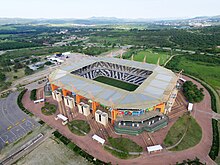
Although the stadium is widely known for corruption it is ironic that the stadium became a model in terms of the lowest total cost. Mbombela Stadium stands out as being the lowest-cost new 2010 stadium by quite a large margin and the highest ratio of seats under roof.
Corruption was reported about other World Cup-related contracts, however the stadium construction itself proceeded without any controversy. Attempted manipulation of stadium construction sub-contracts by Lefika was successfully blocked by principled officials within the Municipality and the Project Manager.
The worst erroneous spending that has come to light was a very expensive sod turning ceremony costing more than R2 million, and a R590,000 invoice for a business plan that was inflated to R2.4 million by Lefika, with payment forced through by the municipal manager Jacob Dladla. It was reported that an expensive car was purchased as a gift for Dladla at the time. He was arrested on related charges in October 2012 and released on bail.
| STADIUM | Cost | % seats under roof |
|---|---|---|
| Mbombela Stadium | Rand 1.05 billion (USD $ 150 million) | 94% |
| Peter Mokaba Stadium | Rand 1.24 billion (USD $ 165 million) | 28% |
| Nelson Mandela Bay Stadium | Rand 2.1 billion (USD $ 280 million) | 69% |
| Soccer City | Rand 3.3 billion (USD $ 440 million) | 66% |
| Moses Mabihda Stadium | Rand 3.4 billion (USD $ 450 million) | 90% |
| Cape Town Stadium | Rand 4.4 billion (USD $ 580 million) | 94% |
Local community
Promises of improvements to Mattafin, the impoverished surrounding township have not been fulfilled. Students from the local primary and high schools had to be relocated to container classrooms and the old schools used by the General Contractor. It took multiple violent protests to get the authorities to finally build the new schools 3 years after they were promised. The land belonging to the Matsafeni trust was secretly sold for R1 by Mattafin community leaders to the Mbombela Local Municipality for the new stadium in exchange for other rights. The sale was set aside three years later when the community launched a legal challenge and reinstated with a market related price.
Wetland
To make way for a replacement school, a wetland was bulldozed, but no environmental impact assessment was done before the wetland was destroyed.
Tournament results
2010 FIFA World Cup
| Date | Time (UTC+2) | Team No. 1 | Result | Team No. 2 | Round | Attendance |
|---|---|---|---|---|---|---|
| 16 June 2010 | 13:30 | 0–1 | Group H | 32,664 | ||
| 20 June 2010 | 16:00 | 1–1 | Group F | 38,229 | ||
| 23 June 2010 | 20:30 | 2–1 | Group D | 37,836 | ||
| 25 June 2010 | 16:00 | 0–3 | Group G | 34,763 |
2013 African Cup of Nations
| Date | Time (UTC+2) | Team No. 1 | Result | Team No. 2 | Round | Attendance |
|---|---|---|---|---|---|---|
| 21 January 2013 | 17:00 | 1–1 | Group C | 15,500 | ||
| 20:00 | 1–1 | 13,500 | ||||
| 25 January 2013 | 17:00 | 1–1 | 25,000 | |||
| 20:00 | 4–0 | 35,000 | ||||
| 29 January 2013 | 19:00 | 0–0 | 8,000 | |||
| 30 January 2013 | 18:30 | 1–1 | Group D | 7,500 | ||
| 3 February 2013 | 18:30 | 1–0 (a.e.t.) | Quarter-final | 27,000 | ||
| 6 February 2013 | 18:30 | 1–1 (a.e.t.) (3–2 pen.) | Semi-final | 30,000 |
Inaugural game
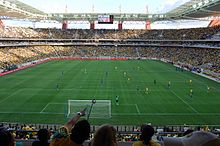
On 16 May 2010, the stadium was officially opened with an international friendly match between South Africa and Thailand. South Africa won 4–0, leading 3–0 at half time.
After the World Cup
The stadium has been managed since after the World Cup, under contract, by Platinum Sport Consulting. Because it is the only large venue in the province it has had high utililisation in contrast to expectations that it would not serve much purpose after the World Cup.
Rugby at the stadium
The Pumas are the main rugby tenants. They will play all Currie Cup matches at the stadium, while most Vodacom Cup matches will be played at Puma Stadium.
The stadium held its first rugby match on 27 August 2010. The Pumas hosted the Blue Bulls in a 2010 Currie Cup match. Pumas won 22–21, trailing 10–11 at half time.
The Pumas made use of the stadium again, when they hosted Western Province on 17 September 2010. Western Province won the match 62–10.
The country's national team, popularly known as the Springboks, played their first match at the stadium against Scotland on 15 June 2013. This match was the second half of a doubleheader, with the curtain-raiser being a matchup between Samoa and Italy. The two composed the second round of a one-off four-team tournament that served partly as a warm-up for the Boks' 2013 Rugby Championship campaign.
South Africa hosted Wales at the stadium on 21 June 2014 in the second test of Wales' 2014 South African tour. The Springboks won the match 31–30.
The Boks played Argentina at the stadium on 20 August 2016. The Springboks won 30–23.
The first time the All Blacks would play against the Boks at Mbombela Stadium was scheduled for 26 September 2020 but the game was cancelled due the COVID-19 pandemic. The rescheduled match was held on 6 August 2022, with South Africa winning 26–10.
The Springboks played Argentina again on 28th September 2024 to a sold out Mbombela Stadium (crowd of 43 578 people). The Springoks won 48-7
Football (soccer)
The stadium was again used by South Africa when they beat Niger 2–0 on 4 September 2010, in a 2012 Africa Cup of Nations qualifier.
On 14 November 2010, the stadium hosted its first Premiership match. Wits moved their match against Mamelodi Sundowns to the stadium.
See also
- FIFA
- FIFA Men's World Rankings
- FIFA Women's World Cup
- FIFA Women's World Rankings
- List of stadiums in South Africa
- South Africa national football team
- Lists of stadiums
References
- ^ "Nelspruit's true African stadium". News24. Retrieved 10 August 2022.
- ^ "Mbombela Stadium | SPRINGBOKS vs WALES tickets information". pumasrugbyunion.com. Retrieved 10 August 2022.
- ^ "Mbombela Stadium | SPRINGBOKS vs WALES tickets information". pumasrugbyunion.com. Retrieved 10 August 2022.
- ^ "2010 stadium staff fired". Times LIVE. 1 September 2009. Retrieved 18 May 2010.
- ^ "Storm causes crane to collapse: News24: South Africa: News". News24. 6 January 2009. Archived from the original on 4 March 2012. Retrieved 18 May 2010.
- ^ "Mbombela Stadium | SPRINGBOKS vs WALES tickets information". pumasrugbyunion.com. Retrieved 10 August 2022.
- ^ "Archived copy". Archived from the original on 16 August 2016. Retrieved 3 July 2016.
{{cite web}}: CS1 maint: archived copy as title (link) - ^ "Mbombela pitch a disgrace – Adebayor". iol.co.za. 31 January 2013. Retrieved 30 September 2020.
- ^ "Caf defend Mbombela Stadium". The Herald. 1 February 2013. Retrieved 30 September 2020.
- ^ "Mbombela Stadium, South Africa – Mott MacDonald". www.mottmac.com. Archived from the original on 17 June 2018. Retrieved 17 June 2018.
- ^ Bearak, Barry (12 March 2010). "Cost of Stadium Reveals Tensions in South Africa". The New York Times. Archived from the original on 25 May 2017. Retrieved 25 February 2017.
- ^ "Scandal of SA's 'giraffe stadium'". BBC News. 7 June 2010. Archived from the original on 7 June 2010. Retrieved 7 June 2010.
- ^ "Who killed Jimmy Mohlala?". Archived from the original on 6 March 2012. Retrieved 17 June 2018.
- ^ "Mabuza opens case against those saying he's an assassin". Archived from the original on 14 August 2018. Retrieved 14 August 2018.
- ^ "Home". Archived from the original on 27 January 2013. Retrieved 26 April 2013.
- ^ "The three years leading to Jimmy Mohlala's death | Ziwaphi Online". Archived from the original on 10 June 2016. Retrieved 27 May 2016.
- ^ "Jimmy Mohlala, World Cup Whistleblower, Shot to Death in South Africa – The Run of Play". www.runofplay.com. Archived from the original on 27 April 2016. Retrieved 17 June 2018.
- ^ "SACP demands answers on Jimmy Mohlala assassination". News24. Archived from the original on 30 June 2016. Retrieved 17 June 2018.
- ^ "This man has been in witness protection for 15 months because 'David Mabuza wants me dead'". 15 August 2019. Archived from the original on 16 August 2019. Retrieved 16 August 2019.
- ^ Sindane, Lucky. "2010 big shot skips SA". The M&G Online. Retrieved 17 June 2018.
- ^ "Police knew about Motaung". News24. Archived from the original on 19 August 2012. Retrieved 17 June 2018.
- ^ "Chiefs boss faces R143m fraud rap | Pretoria News". Archived from the original on 20 September 2015. Retrieved 17 June 2018.
- ^ "Bobby Motaung to face the music". CityPress. Archived from the original on 25 January 2016. Retrieved 17 June 2018.
- ^ "SowetanLIVE". www.sowetanlive.co.za. Archived from the original on 15 February 2017. Retrieved 17 June 2018.
- ^ "Mbombela Stadium fraud case to be dropped – NPA". CityPress. Archived from the original on 22 January 2018. Retrieved 17 June 2018.
- ^ "Ntlemeza controls Motaung's fate". CityPress. Retrieved 17 June 2018.
- ^ 2010 World Cup whistle-blower shot dead
- ^ "Archived copy". Archived from the original on 30 January 2016. Retrieved 5 March 2012.
{{cite web}}: CS1 maint: archived copy as title (link) - ^ "In the squalid shadows of SA stadium". BBC News. 7 June 2010. Archived from the original on 10 June 2010. Retrieved 7 June 2010.
- ^ "Archived copy". Archived from the original on 10 August 2016. Retrieved 7 June 2010.
{{cite web}}: CS1 maint: archived copy as title (link) - ^ "Missing documents stall Mbombela deal". 19 November 2010. Archived from the original on 4 December 2011. Retrieved 19 August 2012.
- ^ "Pumas to play at Mbombela". News24. Archived from the original on 20 March 2012. Retrieved 17 June 2018.
- ^ "Lowvelder". Lowvelder. Archived from the original on 3 March 2016. Retrieved 17 June 2018.
- ^ "Pumas christen Mbombela in style".
- ^ "Bok 2014 schedule confirmed". Sport. Archived from the original on 6 March 2014. Retrieved 17 June 2018.
- ^ "South Africa score last-gasp try to seal comeback win over Argentina". the Guardian. 20 August 2016. Retrieved 18 July 2022.
- ^ Mostert, Herman. "RECAP - Dominant Springboks put hapless All Blacks to the sword in Rugby Championship opener". Sport. Retrieved 6 August 2022.
- ^ "Boks overpower Pumas to bag more silverware in Mbombela". SA Rugby. Retrieved 30 September 2024.
- ^ "Wits shift Downs match to Nelspruit". Kickoff.com. 5 November 2010. Archived from the original on 7 November 2010. Retrieved 5 November 2010.